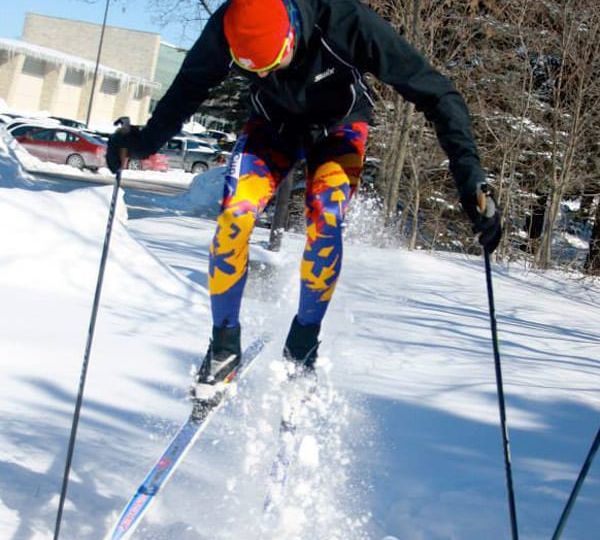
This past Sunday, a small number of St. Olaf students attended the SustainAbilities Winter Olympics in Tostrud Center, participating in team events like an outdoor relay which included snowshoeing, a sled pull and a biathlon, dodgeball and the basketball game “Lightning.” All visitors, team members and spectators alike, were able to play on a variety of inflatable obstacle courses, eat SustainAbilities-provided food out of mugs which have since been donated to the Cage and sign a petition spearheaded by the Environmental Coalition that would encourage the study body to vote on whether or not St. Olaf should become a carbon-neutral campus.
Carbon-neutrality was a prevalent theme during the event. When teams signed up, each had to choose from a list of countries that they could represent at the games. Unknown to the team at sign-up, the actual carbon footprint of their corresponding country would be held against them during the events for example, blindfolding one team member. Teams could “off-set” this carbon footprint during the week before the Olympics by posting photos of team members engaging in sustainable activities like carpooling, going trayless or recycling to Facebook.
Though they came in at a huge disadvantage, Team U.S.A. won the award for “Most Sustainable” at the end of the evening. According to Katie Myhre ’16, the Hilleboe and Kittelsby Hall representative for SustainAbilities, this outcome proves “that even though the U.S. has a huge carbon footprint, it is indeed possible to change our behavior for the better.” The first- and second-place teams were awarded coffee tumblers for their commitment to sustainability.
While events like the SustainAbilities Olympics are fun and public in nature, they only scratch the surface of what the organization is attempting to accomplish on campus.
SustainAbilities is funded via a grant from an anonymous party. The grant, which funds the Environmental Conversations program along with SustainAbilities, was written by the late Professor of History, Environmental Studies and American Studies Jim Farrell in response to a 2011 campus-wide survey in which 94 percent of first-year students said that at a place like St. Olaf, they expected to learn to live sustainably in their residence halls.
“Many students at St. Olaf, especially juniors and seniors, misunderstand what SustainAbilities is and how it functions,” said George Brand ’14, SustainAbilities student representative coordinator and representative for Ytterboe Hall. “Our purpose is to teach St. Olaf students how to live sustainably in residence halls. Our goal is to demonstrate and educate students on environmentally-friendly living practices in the hopes that students will leave St. Olaf with a better understanding of the natural world and the environmental issues our generation faces.”
Each residence hall on campus has a SustainAbilities representative who hosts an event each month for their dorm. Some representatives have hosted fieldtrips to the Northfield Recycling Plant and to local harvest festivals or have coordinated planting sessions and D.I.Y. laundry detergent mixing. In addition to individual dorm representatives, SustainAbilities also has a small marketing team to help advertise these and other campus-wide events, including an Iron Chef Cook-Off, the 12 Days of SustainAbilities and, of course, the SustainAbilities Olympics.
Many of these small-scale events, including the screening of three notable environmental documentaries over Interim, have poor attendance, a result that Brand attributes to a lack of conscious activism on the part of St. Olaf students.
“Although 94 percent of students may claim that they expect to live sustainably while at St. Olaf, I’ve found that a far smaller percentage of students are actually willing to do so,” he said. “Part of the struggle with SustainAbilities and environmentalism as a whole is that it’s much easier to talk the talk than to walk the walk. A student may say they want to live sustainably on a survey, but it’s much harder for students to remain committed to this priority when they’re in such a busy college atmosphere.”
This is the second year of the two-year grant program, and while the future of SustainAbilities is thus far unknown, Brand expects the program to persist in some capacity because of how integral it is to creating responsible and committed citizens of the world – something St. Olaf strives for.
“SustainAbilities is about changing the way people think about their place in the world,” Brand said. “It’s not about getting people to go trayless or meatless. It’s not about shaming people into air-drying their clothes or riding their bikes everywhere. SustainAbilities is trying to change the culture of environmentalism from being an esoteric stereotype into being a mainstream commitment and, ultimately, a priority.”
moes@stolaf.edu
Photo courtesy of Kelly Meza Prado

